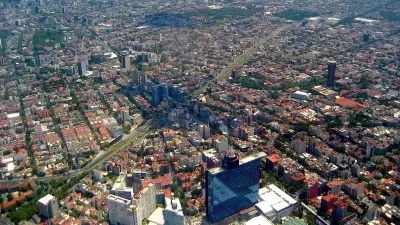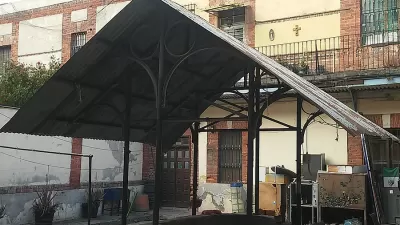A proposal to restore Mexico City's 45 rivers envisions a whole new model for the city.

The Miguel Alemán Viaduct, a major highway through the middle of Mexico City, runs on either side of a river encased in concrete.
A coalition of academics, designers, planners, environmentalists, and artists is proposing to uncover more than 9 miles of the river—as well as the city's 44 other rivers currently serving as a drainage network.
Alejandra Sánchez Inzunza explains the proposal in CityLab. It would include public transit, bike lanes, walking paths, and green space. It would create an integrated water management system. And it would cost 15 billion Mexican pesos—or $863 million.
It's still entirely conceptual, and its main purpose is to help citizens reimagine what's possible in the built environment:
"This project shatters paradigms. It proposes to tear down a private road, which you cannot use unless you have a car. What we propose is that we remove the cars, open the pipes, and treat the water. We need to transform the model of our city," says urban biologist Delfín Montañana.
FULL STORY: Mexico City's Invisible Rivers

Planetizen Federal Action Tracker
A weekly monitor of how Trump’s orders and actions are impacting planners and planning in America.

Maui's Vacation Rental Debate Turns Ugly
Verbal attacks, misinformation campaigns and fistfights plague a high-stakes debate to convert thousands of vacation rentals into long-term housing.

Restaurant Patios Were a Pandemic Win — Why Were They so Hard to Keep?
Social distancing requirements and changes in travel patterns prompted cities to pilot new uses for street and sidewalk space. Then it got complicated.

In California Battle of Housing vs. Environment, Housing Just Won
A new state law significantly limits the power of CEQA, an environmental review law that served as a powerful tool for blocking new development.

Boulder Eliminates Parking Minimums Citywide
Officials estimate the cost of building a single underground parking space at up to $100,000.

Orange County, Florida Adopts Largest US “Sprawl Repair” Code
The ‘Orange Code’ seeks to rectify decades of sprawl-inducing, car-oriented development.
Urban Design for Planners 1: Software Tools
This six-course series explores essential urban design concepts using open source software and equips planners with the tools they need to participate fully in the urban design process.
Planning for Universal Design
Learn the tools for implementing Universal Design in planning regulations.
Heyer Gruel & Associates PA
JM Goldson LLC
Custer County Colorado
City of Camden Redevelopment Agency
City of Astoria
Transportation Research & Education Center (TREC) at Portland State University
Jefferson Parish Government
Camden Redevelopment Agency
City of Claremont




























